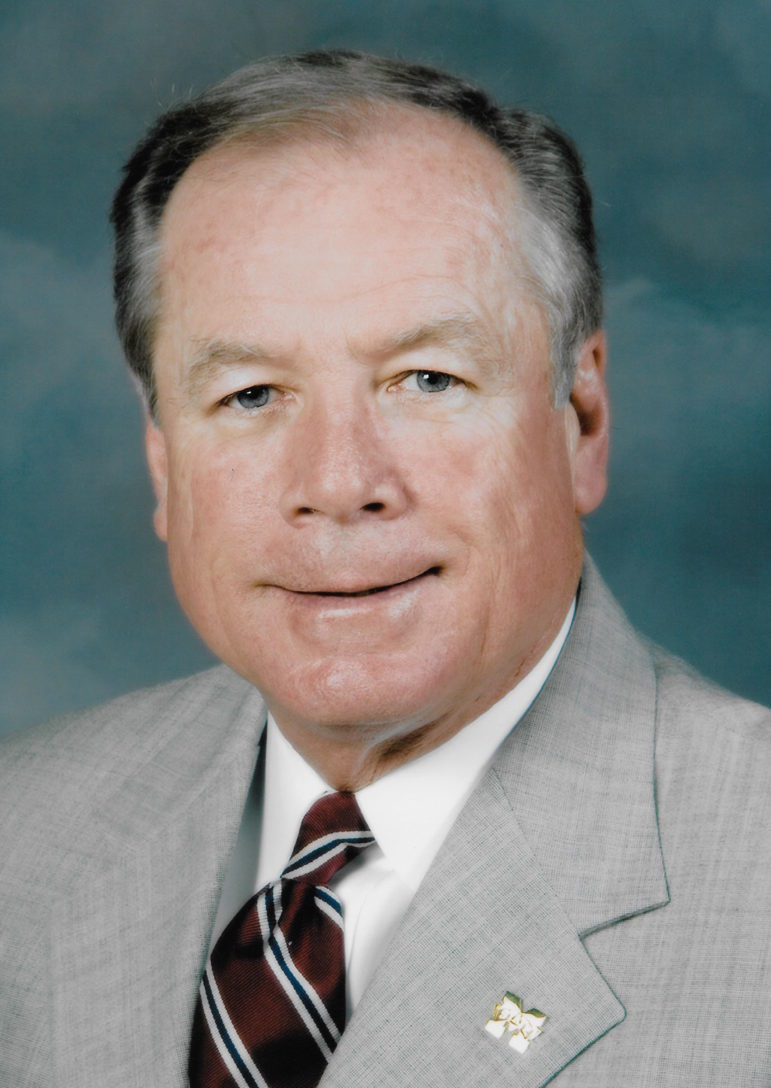Mississippi Today
All Ron Polk did in Mississippi was make college baseball matter

All Ron Polk did in Mississippi was make college baseball matter

This was back in December of 1975. Ron Polk, who was 31, had just been hired from Georgia Southern as the baseball coach at Mississippi State for a salary of $15,000 a year.
A month before, Clarion Ledger published news of Polk’s hiring in a three paragraph story on page 4 of the sports section. A story previewing a Millsaps football game ran on the sports front, along with a story about football coach Bob Tyler’s contract extension and a story about a Delta State women’s basketball exhibition game. College baseball just wasn’t front page news.

Back then, I was the sports editor of the Hattiesburg American and Polk had come to the Hub City to speak to a State alumni group. The late John Buckley, perhaps the most avid Bulldog fan ever, invited my dad and me over to his home to meet Polk.
Three things I remember most about first meeting Polk nearly 48 years ago: 1) he wore two-tone loafers, brown and white; 2) he had a cowlick in his close-cropped hair toward the back of his head; and 3) he was as confident-bordering-on-cocky as any man I had ever met.
Polk told us he was about to change college baseball in Mississippi forever. He said he was going to sell season tickets by the thousands, and it wouldn’t be long before Dudy Noble Field was expanded. He said was going to hold clinics to educate Mississippi’s high school baseball coaches, who at the time were mostly assistant football coaches. Mississippi baseball, he said, was about to get a lot better. He spoke about all that as if it were a matter of fact. At the time, it sounded like so much heresy.
Later, after we had left, I asked Dad what he thought. “Cockiest little banty rooster I’ve ever met,” Dad said.
I agreed. We both laughed and then agreed that if Polk were able to do all that, Mississippi State would need to build a statue in his honor. We laughed even harder.
Now, nearly half a century later, that bronze statue will be dedicated Friday afternoon prior to the first game of the Ole Miss-State weekend series at the entrance down the right field line at what is now Polk-Dement Stadium. All Polk said he would do, he did a long time ago. He has done a lot more.
This column will not be so much about Polk’s 1,373 career victories, the six different Hall of Fame inductions, the eight different teams he took to the College World Series, the 10 different SEC Championships and how he really did change college baseball in Mississippi forever.

No, this hopefully will tell you more about man. We’ll begin with perhaps my favorite Polk anecdote. This was the spring of 1998, the year after Polk had retired (for the first time) as State’s baseball coach. Pat McMahon’s Bulldogs were hosting an NCAA Regional and Polk was watching from the press box. Polk reached into his briefcase, took out a fat, 8-inch Honduran cigar and fired it up. Just over his head was a “No Smoking” sign, which I pointed out and told him, “I know you’re old and retired but I didn’t know you had forgotten how to read.”
Ron smiled, took a huge draw and exhaled a huge plume of smoke. He pointed to the centerfield wall where his name was prominent.
Said Polk, “Seems to me, you are the one who can’t read.”
From the same year, same regional, same press box: Polk joined broadcaster Jim Ellis to do an inning or two of commentary. I dropped into the booth listen. State’s fine shortstop Brad Freeman, now an NFL official, was at the plate when Polk said, “You know, Jim, Brad is so conscious of reaching that outside slider, he’s really crowding the plate. If he gets a fastball inside, it’s gonna hit him.”
Sure enough, the next pitch was a heater, in, and plunked Freeman flush on his left shoulder. Polk never missed a beat. “You know, Jim,” he said, “this radio commentating is pretty easy stuff.”
Polk retired, briefly, as State’s baseball coach in 1995. He planned to take the job as director of the American Baseball Coaches Association (ABCA) and turned his resignation into the athletic director Larry Templeton, who subsequently offered the job to Pat McMahon. A couple days later, Polk had a change of heart and told Templeton he wanted to stay.
Templeton told Polk he already offered the job to former Polk assistant McMahon, then the head coach at Old Dominion. Templeton told Polk he’d see what he could do. So Templeton asked McMahon if he would consider assisting Polk as associate head coach for two years. McMahon, because of his immense respect for Polk, agreed to do just that.
Two years and another MSU trip to the College World Series later, McMahon took over.
Said Templeton, “I told Ron I needed him to help me raise the money to add skyboxes to Dudy Noble and he agreed.”
Polk spent the 1998 and ’99 seasons out of a dugout for the first time in more than three decades, helping Templeton as a special assistant. Says Templeton, “I have never seen anyone as miserable as Ron was away from the game.”

And then Templeton’s phone rang and the guy on the other end of the phone line was Georgia athletic director Vince Dooley. “I need a baseball coach,” Dooley said. “Got any suggestions?”
Templeton said he might know just the guy. He walked down the hallway and into Polk’s office and told him about the Georgia situation. Long story short: Polk went to Athens, interviewed with Dooley and was offered the job. Polk took it.
Polk came back to Starkville and told Templeton he was the new Georgia baseball coach. Templeton congratulated him and asked him what Georgia was paying him. Polk told him and Templeton said, “That’s not right.”
“So I called Vince and I told him that we paid Mississippi State assistant coaches better than what he was going to pay Polk to be the head coach,” Templeton said. “Vince explained that he had asked Ron what he wanted and that Ron told him, ‘Just pay me what the previous guy was making.’”
Templeton said Dooley asked him what he thought would be a fair salary, and Templeton told him.
“That’s all it took,” Templeton said. “Ron got a $75,000 raise before he ever coached a practice.”
Polk, as always, earned his keep. Georgia was 25-30 the year before he got there. His first Georgia team won 32 games. The second won 47, the SEC championship and went to the 2001 College World Series.
Polk was still in Omaha with Georgia when the news broke that McMahon was leaving Mississippi State to take the Florida baseball job. This time, it was Templeton who called Dooley.
He told Dooley: “Vince, now I’m the one who needs a baseball coach, and I am calling you because it’s time for Ron Polk to come home.”
That’s exactly what happened. Polk came back to State and coached seven more seasons and went on to five NCAA Tournaments and one College World Series.
Says Templeton, “The whole time I was the athletic director I never had to worry about who was going to lock the doors of the athletic department at the end of the work day. Ron was always the last one to leave, often after midnight, and he always locked the door behind him.”
Again, when Polk was first hired at State (by Charley Shira at a State-LSU football game), the news ran on page four of the sports section of the state’s largest newspaper. There was no press conference. There was no need for one. It simply wasn’t big news. Contrast that with when Polk finally retired for good. The news was the lead story on the front page of the Clarion Ledger and there were several more stories in the sports section. The press conference was packed with reporters and TV cameras.
That might be the best measure Polk changed college baseball in this state. He made it matter. That’s all he did. He made it matter.
This article first appeared on Mississippi Today and is republished here under a Creative Commons license.
Mississippi Today
1964: Mississippi Freedom Democratic Party was formed
April 26, 1964

Civil rights activists started the Mississippi Freedom Democratic Party to challenge the state’s all-white regular delegation to the Democratic National Convention.
The regulars had already adopted this resolution: “We oppose, condemn and deplore the Civil Rights Act of 1964 … We believe in separation of the races in all phases of our society. It is our belief that the separation of the races is necessary for the peace and tranquility of all the people of Mississippi, and the continuing good relationship which has existed over the years.”
In reality, Black Mississippians had been victims of intimidation, harassment and violence for daring to try and vote as well as laws passed to disenfranchise them. As a result, by 1964, only 6% of Black Mississippians were permitted to vote. A year earlier, activists had run a mock election in which thousands of Black Mississippians showed they would vote if given an opportunity.
In August 1964, the Freedom Party decided to challenge the all-white delegation, saying they had been illegally elected in a segregated process and had no intention of supporting President Lyndon B. Johnson in the November election.
The prediction proved true, with white Mississippi Democrats overwhelmingly supporting Republican candidate Barry Goldwater, who opposed the Civil Rights Act. While the activists fell short of replacing the regulars, their courageous stand led to changes in both parties.
This article first appeared on Mississippi Today and is republished here under a Creative Commons Attribution-NoDerivatives 4.0 International License.![]()
Mississippi Today
Mississippi River flooding Vicksburg, expected to crest on Monday
Warren County Emergency Management Director John Elfer said Friday floodwaters from the Mississippi River, which have reached homes in and around Vicksburg, will likely persist until early May. Elfer estimated there areabout 15 to 20 roads underwater in the area.
“We’re about half a foot (on the river gauge) from a major flood,” he said. “But we don’t think it’s going to be like in 2011, so we can kind of manage this.”
The National Weather projects the river to crest at 49.5 feet on Monday, making it the highest peak at the Vicksburg gauge since 2020. Elfer said some residents in north Vicksburg — including at the Ford Subdivision as well as near Chickasaw Road and Hutson Street — are having to take boats to get home, adding that those who live on the unprotected side of the levee are generally prepared for flooding.



“There are a few (inundated homes), but we’ve mitigated a lot of them,” he said. “Some of the structures have been torn down or raised. There are a few people that still live on the wet side of the levee, but they kind of know what to expect. So we’re not too concerned with that.”
The river first reached flood stage in the city — 43 feet — on April 14. State officials closed Highway 465, which connects the Eagle Lake community just north of Vicksburg to Highway 61, last Friday.

Elfer said the areas impacted are mostly residential and he didn’t believe any businesses have been affected, emphasizing that downtown Vicksburg is still safe for visitors. He said Warren County has worked with the U.S. Army Corps of Engineers and the Mississippi Emergency Management Agency to secure pumps and barriers.
“Everybody thus far has been very cooperative,” he said. “We continue to tell people stay out of the flood areas, don’t drive around barricades and don’t drive around road close signs. Not only is it illegal, it’s dangerous.”
NWS projects the river to stay at flood stage in Vicksburg until May 6. The river reached its record crest of 57.1 feet in 2011.




This article first appeared on Mississippi Today and is republished here under a Creative Commons Attribution-NoDerivatives 4.0 International License.![]()
Mississippi Today
With domestic violence law, victims ‘will be a number with a purpose,’ mother says
Joslin Napier. Carlos Collins. Bailey Mae Reed.
They are among Mississippi domestic violence homicide victims whose family members carried their photos as the governor signed a bill that will establish a board to study such deaths and how to prevent them.
Tara Gandy, who lost her daughter Napier in Waynesboro in 2022, said it’s a moment she plans to tell her 5-year-old grandson about when he is old enough. Napier’s presence, in spirit, at the bill signing can be another way for her grandson to feel proud of his mother.
“(The board) will allow for my daughter and those who have already lost their lives to domestic violence … to no longer be just a number,” Gandy said. “They will be a number with a purpose.”
Family members at the April 15 private bill signing included Ashla Hudson, whose son Collins, died last year in Jackson. Grandparents Mary and Charles Reed and brother Colby Kernell attended the event in honor of Bailey Mae Reed, who died in Oxford in 2023.
Joining them were staff and board members from the Mississippi Coalition Against Domestic Violence, the statewide group that supports shelters and advocated for the passage of Senate Bill 2886 to form a Domestic Violence Facility Review Board.
The law will go into effect July 1, and the coalition hopes to partner with elected officials who will make recommendations for members to serve on the board. The coalition wants to see appointees who have frontline experience with domestic violence survivors, said Luis Montgomery, public policy specialist for the coalition.
A spokesperson from Gov. Tate Reeves’ office did not respond to a request for comment Friday.
Establishment of the board would make Mississippi the 45th state to review domestic violence fatalities.
Montgomery has worked on passing a review board bill since December 2023. After an unsuccessful effort in 2024, the coalition worked to build support and educate people about the need for such a board.
In the recent legislative session, there were House and Senate versions of the bill that unanimously passed their respective chambers. Authors of the bills are from both political parties.
The review board is tasked with reviewing a variety of documents to learn about the lead up and circumstances in which people died in domestic violence-related fatalities, near fatalities and suicides – records that can include police records, court documents, medical records and more.
From each review, trends will emerge and that information can be used for the board to make recommendations to lawmakers about how to prevent domestic violence deaths.
“This is coming at a really great time because we can really get proactive,” Montgomery said.
Without a board and data collection, advocates say it is difficult to know how many people have died or been injured in domestic-violence related incidents.
A Mississippi Today analysis found at least 300 people, including victims, abusers and collateral victims, died from domestic violence between 2020 and 2024. That analysis came from reviewing local news stories, the Gun Violence Archive, the National Gun Violence Memorial, law enforcement reports and court documents.
Some recent cases the board could review are the deaths of Collins, Napier and Reed.
In court records, prosecutors wrote that Napier, 24, faced increased violence after ending a relationship with Chance Fabian Jones. She took action, including purchasing a firearm and filing for a protective order against Jones.
Jones’s trial is set for May 12 in Wayne County. His indictment for capital murder came on the first anniversary of her death, according to court records.
Collins, 25, worked as a nurse and was from Yazoo City. His ex-boyfriend Marcus Johnson has been indicted for capital murder and shooting into Collins’ apartment. Family members say Collins had filed several restraining orders against Johnson.
Johnson was denied bond and remains in jail. His trial is scheduled for July 28 in Hinds County.
He was a Jackson police officer for eight months in 2013. Johnson was separated from the department pending disciplinary action leading up to immediate termination, but he resigned before he was fired, Jackson police confirmed to local media.
Reed, 21, was born and raised in Michigan and moved to Water Valley to live with her grandparents and help care for her cousin, according to her obituary.
Kylan Jacques Phillips was charged with first degree murder for beating Reed, according to court records. In February, the court ordered him to undergo a mental evaluation to determine if he is competent to stand trial, according to court documents.
At the bill signing, Gandy said it was bittersweet and an honor to meet the families of other domestic violence homicide victims.
“We were there knowing we are not alone, we can travel this road together and hopefully find ways to prevent and bring more awareness about domestic violence,” she said.
This article first appeared on Mississippi Today and is republished here under a Creative Commons Attribution-NoDerivatives 4.0 International License.
-

 News from the South - Florida News Feed6 days ago
News from the South - Florida News Feed6 days agoJim talks with Rep. Robert Andrade about his investigation into the Hope Florida Foundation
-

 News from the South - Alabama News Feed5 days ago
News from the South - Alabama News Feed5 days agoPrayer Vigil Held for Ronald Dumas Jr., Family Continues to Pray for His Return | April 21, 2025 | N
-

 Mississippi Today5 days ago
Mississippi Today5 days ago‘Trainwreck on the horizon’: The costly pains of Mississippi’s small water and sewer systems
-

 News from the South - Texas News Feed5 days ago
News from the South - Texas News Feed5 days agoMeteorologist Chita Craft is tracking a Severe Thunderstorm Warning that's in effect now
-

 News from the South - Florida News Feed4 days ago
News from the South - Florida News Feed4 days agoTrump touts manufacturing while undercutting state efforts to help factories
-

 News from the South - Virginia News Feed5 days ago
News from the South - Virginia News Feed5 days agoTaking video of military bases using drones could be outlawed | Virginia
-

 News from the South - Texas News Feed7 days ago
News from the South - Texas News Feed7 days agoNo. 3 Texas walks off No. 9 LSU again to capture crucial SEC softball series
-

 News from the South - Florida News Feed4 days ago
News from the South - Florida News Feed4 days agoFederal report due on Lumbee Tribe of North Carolina’s path to recognition as a tribal nation














































